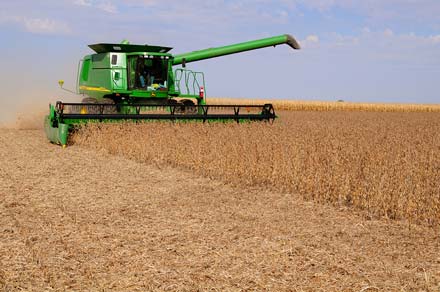
The H-2A Agricultural Guest Worker Program, often called the H-2A visa program, helps employers hire foreign workers for temporary agricultural jobs. The H-2A program was authorized by Congress under the Immigration and Nationality Act of 1952. This publication provides an overview of the H-2A program for Missouri agricultural producers.
Background
Farms began to use the H-2A program much more in recent years. Certified H-2A positions in the U.S. increased from about 100,000 in 2012 to nearly 385,000 in 2024. The increase in H-2A use reflects changes in the labor market and challenges of finding seasonal and temporary farm labor. There is no U.S. statutory limit on the number of H-2A visas certified each year.
Who can participate
The H-2A program is available to an employer or association of agricultural producers that anticipates a shortage of domestic workers to do agricultural labor or services on a seasonal or temporary basis. The U.S. Department of Labor (DOL) lists these general guidelines for determining if employers are eligible for the H-2A program:
- Be a employer physically located in the United States, possess a valid Federal Employer Identification Number (FEIN), and be able to hire, pay, fire, supervise or otherwise control the work of the workers you employ.
- The work performed must consist of agricultural labor or services.
- The work must be full time (at least 35 hours per week).
- The work must be seasonal or temporary (normally lasting 10 months or less) and tied to a certain time of the year.
State workforce agency
The Missouri Office of Workforce Development is the state’s workforce agency. Its Agricultural Employment Services offers free assistance such as publicly posting a job order placed in connection to an H-2A application, recruitment of domestic U.S. workers and hiring event assistance, labor law information, foreign labor certification assistance, and additional training. Their services also include an outreach program for both domestic and H-2A visa workers. In addition, they conduct housing inspections to assure employers meet the requirements of the H-2A program. You can directly contact AES at aes@dhewd.mo.gov or 573-751-3346.
Who else can help
Every H-2A position must be certified by the U.S. Department of Labor (DOL). Agricultural producers can complete this certification process. In 2024, agricultural employers completed the applications for 219 of the 2,266 certified H-2A positions in Missouri.
Many agricultural employers choose to outsource the H-2A certification process to a firm that specializes in H-2A visas. These firms apply for the visa on behalf of the employer. The DOL defines these authorized representatives as “agents” and “attorneys.” These third-party businesses charge fees for their services and often have experience in H-2A certification and recruitment channels.
Some agents are defined by the DOL as H-2A labor contractors and must follow additional requirements when certifying H-2A positions.
In 2024, agents or attorneys supported the application process of 2,047 Missouri H-2A certified positions.
Table 1 lists the firms used most frequently in 2024 for the process of certifying H-2A positions in Missouri. Firms are named in this publication only for informational purposes with no endorsement intended. If you decide to use an attorney, agent or H-2A labor contractor, conduct your own research and due diligence to select a firm that best meets your farm business needs.
Table 1. Agents or attorneys who helped Missouri agricultural employers with H-2A visas, 2024.
| Firm name | Website | Phone number | Certified workers |
|---|---|---|---|
| AgWorks H2 LLC | maslabor.com/agworksh2 | 434-623-9130 | 334 |
| Agri Placements International | agri-placements.com | 580-227-4747 | 249 |
| másLabor LLC | maslabor.com | 434-623-9130 | 205 |
| Signature Staffing Inc. | Not available | 863-201-9211 | 182 |
| USA Farm Labor Inc. | usafarmlabor.com | 828-246-0659 | 161 |
| H2 Visa Consultants LLC | h2visaconsultants.com | 830-251-4865 | 109 |
| Farmer Law PC | farmerlawpc.com/h-2a-visas | 512-861-2526 | 108 |
| C.O.C Placement Service | Not available | 662-385-4219 | 103 |
| New Century Solutions 2000 Inc. | Not available | 863-273-8870 | 91 |
| Seso Inc. | sesolabor.com | 434-964-6256 | 84 |
| Subtotal of top 10 sources | 1,626 72% of Missouri |
||
| Other agents or attorneys | 421 19% of Missouri |
||
| Employers themselves | 219 9% of Missouri |
||
| Total certified H-2A workers | 2,266 | ||
| Source: U.S. Department of Labor. Company websites. Listing of firm names and contact information is for informational purposes only and does not imply recommendation or endorsement. |
|||
H-2A process
Employers can apply for the H-2A program using the DOL’s online Foreign Labor Application Gateway, or FLAG System. The standard filing process takes around 60 to 75 calendar days prior to the start day of work. The online system allows the application to be created electronically, tracked throughout the process and reused in future applications. These are the general steps to complete for H-2A visas:
- File an agricultural job order (Form ETA-790/790A) with the Missouri Office of Workforce Development. They will review the job order, help with needed corrections, and initiate recruitment of U.S. workers.
- Submit an H-2A application (Form ETA-9142A) with the DOL’s Chicago National Processing Center (NPC). The NPC will review your application, let you know if additional information is needed, and provide any additional instructions needed to complete the certification.
- Conduct recruitment for U.S. workers after the NPC approves your application. The Missouri Office of Workforce Development will actively recruit in the first two weeks following submission. Recruitment efforts continue until 50 percent of the work contract period has been completed.
- Complete the temporary labor certification process. This step may require additional documents to be submitted to the NPC for the final determination.
- Recruit H-2A workers.
- Complete the hiring process through USCIS (Form I-129), and prospective workers apply for visa and complete interviews at U.S. embassy or consulate.
There are emergency filing provisions for speeding up the filing process if workers are needed sooner than 60 days. These provisions require the same steps as the standard filing process, but the steps are conducted at the same time.
Period of stay
An H-2A worker’s period of stay is defined in the temporary labor certification. However, the H-2A classification may be extended for qualifying employment in increments of up to one year each, with each extension requiring a new, valid temporary labor certification. The maximum period of stay for an H-2A worker is three years. To reset, the worker must remain outside the U.S. for 60 days before becoming reeligible.
Employer requirements
Work contract
Employers must provide a copy of the work contract or job order (ETA Form-790 and attachments) to each H-2A worker. You must provide this documentation between the time that the worker applies for a visa and the first day of work. The work contract must be in a language understood by the worker.
Employers must provide their workers with reasonable access to Missouri Office of Workforce Development Migrant and Seasonal Outreach Program staff.

50 percent rule
H-2A employers must provide employment opportunities to qualified U.S. applicants. You must keep the job position open through the first 50 percent of the H-2A contract period and hire referred U.S. workers. Pay offered must be at least equal to that of H-2A workers.
Worker guarantee
The H-2A program guarantees worker employment hours equal to at least 75 percent of the workdays in the contract period. This provision is called the three-fourths guarantee.
Pay rate and deductions
Except where a special procedure is approved, the employer must offer at least the highest of:
- the adverse effect wage rate (AEWR),
- the prevailing hourly rate or piece rate,
- the agreed-upon collective bargaining wage or
- the applicable federal, state or local minimum wage.
A pay stub must be provided to employees on or before each payday.
Payroll deductions must be specified in the H-2A work contract. Any payroll deductions not required by law must be reasonable.
Workers’ compensation
The H-2A contract requires that employers provide workers’ compensation insurance, or its equivalent, at no charge to the H-2A worker. U.S. workers similarly employed must receive the same provisions.
Housing
Employers must provide housing to H-2A workers not reasonably able to return to their residence within the same day. If you rent housing for H-2A workers, you must pay all the housing charges —rent, deposits, utilities, etc. — directly to the rental housing management. Housing must include a full kitchen and provide access to a laundry facility.
Any housing you provide or secure must meet certain safety standards. The Missouri Office of Workforce Development provides inspections to determine if H-2A housing meets these standards. Inspections will be conducted 30 days prior to worker arrival. Places available for general rent or public accommodation, such as hotels and motels, do not require an inspection.
Meals
You must either provide H-2A workers with three meals per day or furnish free and convenient cooking and kitchen facilities where workers can prepare their own meals. Workers can be charged for provided meals, but costs may not exceed those specified by the DOL.
Transportation
You must provide daily transportation to the worksite at no cost. Transportation must be operated by licensed drivers, meet safety standards and be properly insured. Additionally, transportation to a grocery store must be provided weekly.
Inbound and outbound expenses
Employers are responsible for reasonable costs of H-2A worker transportation to the farm from their previous worksite or country of origin. These costs can be paid at the time of inbound transportation or may be reimbursed to the workers once the work contract period is halfway complete. Costs include both transportation and daily subsistence costs during transportation. You must also provide or pay for workers’ return transportation at the end of the H-2A contract period.
Record requirements
Employers must keep records about their hired workers. These records about H-2A workers should be retained for a three-year period:
- H-2A job order, application, petition and supporting documentation
- Proof of recruitment efforts and recruitment report
- Worker’s total earnings, hours offered and worked, locations of work performed
- Wage deductions and reimbursement for transportation and subsistence costs
- Agent contracts, if used
- Proof of workers’ compensation insurance or state law coverage
Costs
Table 2 lists estimated costs for H-2A employers. Employers may not charge workers for any costs related to employer H-2A certification. Note that this table does not include all fees if a third-party company, i.e., an agent or attorney, helps with navigating the H-2A application process and/or provides recruitment services. If you intend to use a third-party company, ask early about their fee structure.
Table 2. H-2A visa program costs.
| Type of expense | Estimated cost |
|---|---|
| Labor certification: Processing sole employers |
$100 per application, plus $10 per certified worker (maximum of $1,000 total) |
| Nonimmigrant worker petition: Filing and asylum program fees | $460 plus additional fees for small employer or nonprofit with unnamed workers. Cost increases to $545 plus additional fees if named workers. |
| H-2A visa application: Consulate fee |
$190 per worker. Must be reimbursed to worker in first paycheck. |
| H-2A visa application: Border stamp fee |
$6 per worker |
| H-2A visa application: Agent fees |
Approximately $100 per worker |
| Transportation: Transport from home country to work site | $400 to $650 per worker (depends on country of origin) |
| Transportation: Weekly travel to and from a grocery store and other incidentals | Cost varies |
| Miscellaneous costs: Association fees if applicable |
$200 |
| Miscellaneous costs: Housing and livable fittings |
Approximately $9,000 to $13,000 per worker |
| Source: USDA | |